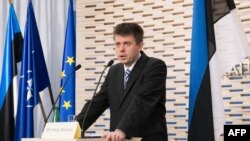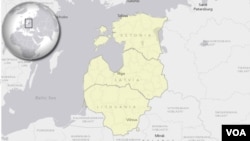WASHINGTON, D.C. —
The recent Russian annexation of Ukraine’s Crimea region has sent shock waves throughout former Soviet republics with sizeable ethnic Russian populations.
Russia justified its annexation of Crimea by saying it was meant to protect ethnic Russians that Moscow said were facing violence and discrimination – charges rejected by Ukraine and by the West.
For the Baltic states of Estonia, Lithuania and Latvia, recent messages from Moscow have been unsettling.
At last week’s UN Human Right Council meeting in Geneva, the Russian delegate expressed concern about the treatment of Estonia's Russian minority.
Earlier this month, Russia said it would offer citizenship to Latvia’s Russians to "save the Latvian noncitizens out of poverty."
And Russia’s Baltic Fleet recently held live fire military exercises along the Baltic coast, billed as part of a “surprise inspection of combat readiness of troops and ammunition.”
“Yes, many Estonians are very much concerned,” Raivo Vetik, professor of comparative politics at Estonia’s Tallinn University, told VOA.
“These kinds of statements by Russian officials trigger, as a rule, heated reactions in the media and among the people. Particularly, in the context of the crisis in Ukraine, many Estonians perceive them as a direct existential threat,” Vetik said.
Vetik said that there are some ethnic tensions in Estonia, but certainly not enough to trigger the kind of unrest that was seen in Ukraine.
“However, if Russia should invade other parts of Ukraine, the situation would definitely change,” he said.
Second-class citizens?
During the Soviet era, thousands of Russians migrated to the Baltic states to work.
“After the collapse of the Soviet Union in the 1990s, the Latvian and Estonian governments implemented citizenship and language legislation dedicated toward creating states of and for ethnic Latvians and ethnic Latvians,” said Michele E. Commercio, Associate Professor at the University of Vermont and expert in Russian minority politics in post-Soviet republics.
Only those Russians who had lived in these countries prior to 1940 were granted automatic citizenship.
Those wanting to naturalize had to pass stringent tests in Latvian or Estonian, languages that are not related to Russian.
Because Russian had been the official language throughout the Soviet era, few were able to pass.
And today, large numbers of Baltic Russians are “stateless,” lacking many of the rights of citizenship, i.e., jobs in the public sector, forming political parties, voting in national elections, not to mention discrimination by locals.
In its 2013 report on Lavia, Amnesty International reported, “Over 300,000 people – about one-sixth of the population, mostly of Russian origin – remained stateless... excluded from political rights.”
But Commercio doesn’t think tensions are heated enough to spark a Crimea-style rebellion.
“Russians may have been excluded from the public sector, but as these economies have grown and prospered, the private sectors in Estonia and Latvia have grown,” she said. “And what we see in the private sectors is a large presence of ethnic Russians who are doing quite well.”
Few have opted to leave the Baltics and return to Russia, she said, because the Russian economy is much weaker.
She said that Lithuania, though a Baltic state with a Russian ethnic minority, is usually left out of this discussion because the Russian population is much smaller and better integrated into the public sector.
All for one
Unlike Ukraine, the Baltics are members of NATO.
The 1949 treaty requires member states to come to the aid of any attacked member, which many believe would deter Putin from making any move towards the Baltic.
Others are not so certain, including Max Boot, Jeane J. Kirkpatrick Senior Fellow in National Security Studies at the Council on Foreign Relations.
“NATO membership may be enough to discourage him, but I don’t necessarily think it’s a given,” Boot said, “because it’s not clear what NATO would actually do if Russia were to commit aggression against the Baltics.”
Boot said he suspects NATO states would be deeply reluctant to go to war with a nuclear-armed state like Russia “just to protect these postage-stamp-sized countries on Russia’s doorstep.”
At the same time, Boot believes protecting the Baltics is important and that NATO must make good on its pledges.
“I think the way to do it would be to beef up the NATO forces which are prepositioned in the Baltic States to make clear to Putin that there are limits to how far his aggression can go.”
Boot believes Putin is looking to resurrect the historic Russian Empire, of which the Baltics were a part.
“I think he’s looking to do whatever he can get away with in order to increase Russian power, prestige and the size of the Russian state,” Boot said.
And he said he doesn’t believe Putin needs any pretext for stirring up the Baltics’ ethnic minorities.
“I don’t know that the Russian speakers in Ukraine were all that unhappy either,” Boot said.
“And I don’t think there was much of a secessionist movement in Crimea until Putin came along and drummed up a secession movement in a matter of weeks and a rigged election to get the results that he wanted,” Boot said.
Russia justified its annexation of Crimea by saying it was meant to protect ethnic Russians that Moscow said were facing violence and discrimination – charges rejected by Ukraine and by the West.
For the Baltic states of Estonia, Lithuania and Latvia, recent messages from Moscow have been unsettling.
At last week’s UN Human Right Council meeting in Geneva, the Russian delegate expressed concern about the treatment of Estonia's Russian minority.
Earlier this month, Russia said it would offer citizenship to Latvia’s Russians to "save the Latvian noncitizens out of poverty."
And Russia’s Baltic Fleet recently held live fire military exercises along the Baltic coast, billed as part of a “surprise inspection of combat readiness of troops and ammunition.”
“Yes, many Estonians are very much concerned,” Raivo Vetik, professor of comparative politics at Estonia’s Tallinn University, told VOA.
“These kinds of statements by Russian officials trigger, as a rule, heated reactions in the media and among the people. Particularly, in the context of the crisis in Ukraine, many Estonians perceive them as a direct existential threat,” Vetik said.
Vetik said that there are some ethnic tensions in Estonia, but certainly not enough to trigger the kind of unrest that was seen in Ukraine.
“However, if Russia should invade other parts of Ukraine, the situation would definitely change,” he said.
Second-class citizens?
During the Soviet era, thousands of Russians migrated to the Baltic states to work.
“After the collapse of the Soviet Union in the 1990s, the Latvian and Estonian governments implemented citizenship and language legislation dedicated toward creating states of and for ethnic Latvians and ethnic Latvians,” said Michele E. Commercio, Associate Professor at the University of Vermont and expert in Russian minority politics in post-Soviet republics.
Only those Russians who had lived in these countries prior to 1940 were granted automatic citizenship.
Those wanting to naturalize had to pass stringent tests in Latvian or Estonian, languages that are not related to Russian.
Because Russian had been the official language throughout the Soviet era, few were able to pass.
And today, large numbers of Baltic Russians are “stateless,” lacking many of the rights of citizenship, i.e., jobs in the public sector, forming political parties, voting in national elections, not to mention discrimination by locals.
In its 2013 report on Lavia, Amnesty International reported, “Over 300,000 people – about one-sixth of the population, mostly of Russian origin – remained stateless... excluded from political rights.”
But Commercio doesn’t think tensions are heated enough to spark a Crimea-style rebellion.
“Russians may have been excluded from the public sector, but as these economies have grown and prospered, the private sectors in Estonia and Latvia have grown,” she said. “And what we see in the private sectors is a large presence of ethnic Russians who are doing quite well.”
Few have opted to leave the Baltics and return to Russia, she said, because the Russian economy is much weaker.
She said that Lithuania, though a Baltic state with a Russian ethnic minority, is usually left out of this discussion because the Russian population is much smaller and better integrated into the public sector.
All for one
Unlike Ukraine, the Baltics are members of NATO.
The 1949 treaty requires member states to come to the aid of any attacked member, which many believe would deter Putin from making any move towards the Baltic.
Others are not so certain, including Max Boot, Jeane J. Kirkpatrick Senior Fellow in National Security Studies at the Council on Foreign Relations.
“NATO membership may be enough to discourage him, but I don’t necessarily think it’s a given,” Boot said, “because it’s not clear what NATO would actually do if Russia were to commit aggression against the Baltics.”
Boot said he suspects NATO states would be deeply reluctant to go to war with a nuclear-armed state like Russia “just to protect these postage-stamp-sized countries on Russia’s doorstep.”
At the same time, Boot believes protecting the Baltics is important and that NATO must make good on its pledges.
“I think the way to do it would be to beef up the NATO forces which are prepositioned in the Baltic States to make clear to Putin that there are limits to how far his aggression can go.”
Boot believes Putin is looking to resurrect the historic Russian Empire, of which the Baltics were a part.
“I think he’s looking to do whatever he can get away with in order to increase Russian power, prestige and the size of the Russian state,” Boot said.
And he said he doesn’t believe Putin needs any pretext for stirring up the Baltics’ ethnic minorities.
“I don’t know that the Russian speakers in Ukraine were all that unhappy either,” Boot said.
“And I don’t think there was much of a secessionist movement in Crimea until Putin came along and drummed up a secession movement in a matter of weeks and a rigged election to get the results that he wanted,” Boot said.







